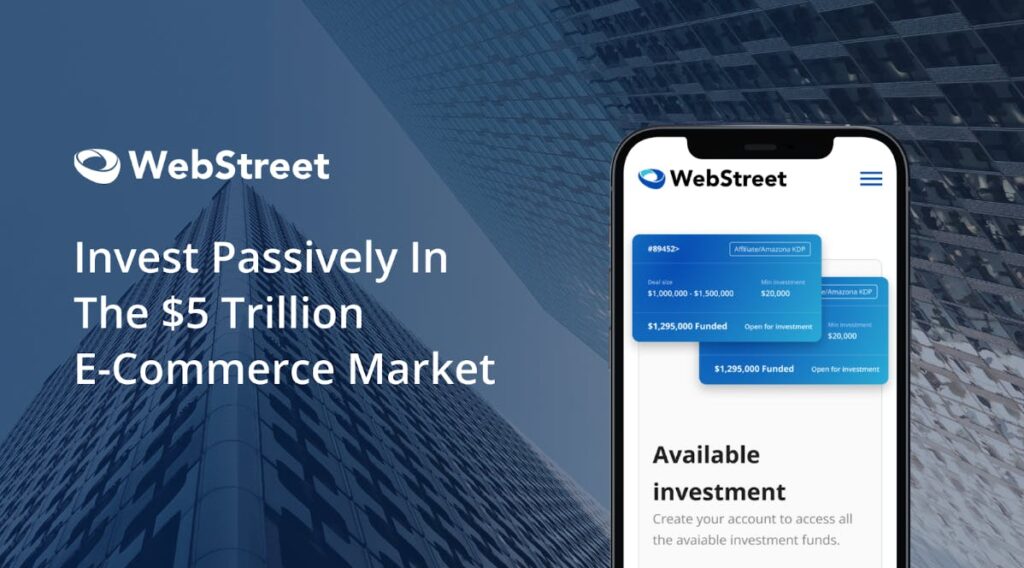Table of Contents
Welcome to the Big Deal.
What’s the Big Deal?
It’s one exclusive investment idea pumped straight into your inbox. It’s specific, actionable, and probably an investment idea you’ve never heard of or thought about.
If you like it, you can invest. If you hate it, you can smash the delete button.
Last time, we featured a company revolutionising the internal combustion engine.
This month, we’re looking at something completely different – it’s an investment platform called WebStreet focussing on flipping digital properties like Amazon stores, content sites, and more.
It’s a higher minimum investment — $60k — and is for accredited investors only. If you invest via this briefing, you get a 30% warrant on top of your equity.
If you want to see more investment opportunities specifically for accredited investors and qualified purchasers, please let me know.
Let’s get to the Big Deal
WebStreet

WebStreet operates a first-of-its-kind investment platform that matches experienced portfolio managers of online businesses with accredited investors.
Deal overview
- Investment type: Preferred equity
- Voting rights: None
- Valuation: $50 million pre-money
- Raising: $3 million to $5 million
- Minimum Investment: $60k
- Alts member perks: 30% warrants
- Campaign closes: August 1, 2023
- Check it out: Funding Page
- AMA Session: Thursday 2pm EST
Webstreet gives the following projected returns numbers. You’ll want to do your own research and form your own conclusions:
- Projected Investor IRR: 28-31% per annum
- Projected Investor MOIC: 3-4x
Dive into their recent Q&A session for lots more detail.
TLDR of why I like it
Everything is on sale right now.
- Startup secondary offerings are trading at a 61% discount.
- Digital asset (content sites etc) multiples have collapsed by more than 20%.
- Fundraising is hell unless you’re in AI.
There’s blood in the water, and WebStreet is the 25 foot great white shark circling around to snack on the chum.
More specifically / less Jaws-y:
WebStreet is a platform taking advantage of underpriced assets and under-utilized operators. They’re looking to deploy capital against a proven playbook, and their growth assumptions are actually fairly conservative assuming Russia doesn’t start a nuclear war or meltdown a reactor.
Two other things I really like:
The company isn’t going for a home run with a trillion dollar valuation, and I actually like that in this environment.
They’re also not fully platform dependent the way all those ill-conceived Amazon FBA aggregators were.
What’s the investment?
This is an equity investment in the WebStreet platform — not one of the funds on the platform. The analogy they use is that you’re buying a stake in the racetrack rather than investing in a particular horse.
While the success of the funds and the platform are linked, it’s a different investment type with a different risk profile.
An investment in one of their funds has an upside that’s limited by the underlying business model. The downside is also limited, because it’s fairly unlikely a portfolio of e.g. content sites is going to zero.
Conversely, this investment is similar to a Series A bet on company with (more or less) unlimited upside. The downside is your money goes to zero. Happens all the time with Series A investments (though obviously we’re bullish on this one).
The shares you’re buying are preferred equity with no voting rights, and investors who come in via ALTS get a 30% warrant on top of the preferred equity.
Check out the Webstreet Investment Page.
What’s the Big Deal?
The Problem WebStreet is Solving
Even though investing in and flipping digital assets like content sites and Amazon stores can be super lucrative, the barriers are high.
First, you need a significant amount of capital to get either off the ground. $100k or more isn’t uncommon if you don’t want to spend years in SEO hell.
Second, you need to know what you’re doing. Unless you’ve got a heck of a lot of skills in your toolkit — SEO, PPC, product sourcing, logistics, distribution, shipping, web maintenance, coding, customer relations, etc, etc, etc — you’ll have to outsource it all. That’s both expensive and risky. And bloody tedious.
Third, and speaking of risk, putting all your financial and temporal eggs into one or two baskets isn’t good for anyone’s blood pressure. Spreading that risk across several of these assets is more prudent.
The WebStreet Solution
From WebStreet:
WebStreet operates a first-of-its-kind investment platform that matches experienced portfolio managers of online businesses with accredited investors. It participates in fund profits with carried interest as well as charging an annual AUM fee. WebStreet has established a successful track record across multiple rounds, validating proof-of-concept and product-market fit:
- 400+ portfolio managers vetted with 13 currently in the program
- 18 funds closed across 5 rounds with $27M raised from 350+ investors
- 33 assets acquired
- 3-4% quarterly cash on cash returns, on track for 20%+ annualized returns over life of funds
It makes sense, and they were correct to go after the higher net worth market before trolling the Reg A and crowdfunding depths. There’s just more money there, and it’s much easier.
How does WebStreet make money
Fees fees fees.
For every round WebStreet raises (four per year), this is their take:
- 1.5% management fees on all AUM
- 1.5% of all capital raised upfront
- 10% carry on asset appreciation
It’s effectively a 1.5/10 model, which is probably a bit lower than it needs to be once the economy comes back around in 2024ish.
As an investor in the platform (but not the funds!) I’d like to see WebStreet hike these fees off the back of strong early results.
Opportunity size
Investors pumped $15 billion into ecommerce aggregators over the last few years. And what’s the sum total value of all the content sites in the world? Trillions?
From the top down, market demand for alternative investments is (my best guess) somewhere between $5 trillion and $15 trillion today and will continue to grow.
WebStreet’s target market is a tiny fraction of a fraction of those trillion dollar numbers. But 1% of 10% of $15 trillion is $15 billion. There are indeed riches in niches.
It’s important to note WebStreet isn’t going for a high-risk billion dollar exit. They’re looking to grow sensibly but aggressively for five to ten years using a proven playbook then sell while generating a solid ROI for shareholders.
If you’re looking for a moonshot unicorn, this isn’t the company for you.
Growth potential
Currently, WebStreet is deploying around $10 million per year, but they’re aiming for $189 million AUM by 2026 and $500 million by 2029.
Becoming a dominant player in the same niche as the $15 billion pumped into ecommerce aggression funds is the most straightforward path to significant numbers, and it’s a road reasonably well tread.
This is how WebStreet says it will deploy its raised capital to grow:
- People We have a small, hard working team of A-players. Like other investment funds and investment platforms the majority of our expenses are people.
- Platform WebStreet now operates its own standalone tech platform. In order to both perform as a top tier investment platform and give our users a world class experience, we will invest in adding features and functionality. We also plan to iterate on, improve, and automate systems for faster turnaround of customer deliverables such as reports, distributions and tax documents.
- Promotion We are expanding our user base beyond the Empire Flippers core audience through increased marketing activities. We believe that increasing our investor and portfolio manager bases will be critical to our next phase of growth.
About 75% of all funds raised will go into compensation costs. They don’t break down how much of that is new hires vs increased compensation for current employees.
Traction
So far, WebStreet has raised and deployed five funds with the following profiles and returns:
Round 1
- 4 portfolios including Affiliate, Display, FBA
- 11 assets acquired
- 20.1% cash on cash returns over 6 full quarters
Round 2
- 4 portfolios including Affiliate, Display, FBA, KDP
- 12 assets acquired
- 15.4% cash on cash returns over 4 full quarters
Round 3
- 3 portfolios including Affiliate, Display, FBA
- 7 assets acquired
- 5.8% cash on cash returns over 2 full quarters
Round 4
- 1 portfolio including Affiliate, Display
- 3 assets acquired
- 1st full quarter underway
Round 5
- 4 portfolios including Affiliate, Display, FBA
- Acquisitions in progress
Our fund, ALTS 1, invested in round 5, which:
- Is a vote of confidence on our side, but
- Means we may be slightly biased. Bear this in mind.
Revenue generated from these first five rounds was $314k for 2022 and is forecast at $504k for 2023.
Valuation
To reach their goal of $190 million AUM by year four, WebStreet will need to double every year until then. They aim to reach $500m AUM by 2029 against EBITDA of $10.2 million.
I’ve had a look at some publicly traded asset management companies to get a feel for WebStreet’s valuation six years down the line.
There are two ways to do it.
1. As a percent of AUM
For every dollar they manage, how much is the company worth?
Blackstone and Apollo — sort of similar companies though much much larger — trade at between 9% and 11% of their assets under management.
WebStreet Implied valuation – $500 million AUM in 2029 is around $50 million.
The problem with valuing an asset manager on AUM alone is that it ignores what fees they’re charging. A company that charges 2% and 20%, for example, is generating a lot more revenue than one skimming 0.4% off a passive ETF.
2. Fee related earnings
Blackstone, Apollo etc are valued around 33x their fee-related earnings.
WebStreet Implied valuation – $11.2 million forward EBITDA @ 33x is $370 million.
WebStreet is smaller, less sticky, and less diversified than those behemoths, so let’s give that valuation a 50% haircut.
A 16.5x multiple on WebStreet’s 2030 earnings puts it at around $185 million.
Turning the $50 million pre-money valuation into $185 million in six years is around a 30% IRR (not including future dilution).
The risks
Here are the risks and mitigations WebStreet has identified:
Finding Qualified Portfolio Managers:
WebStreet, with a broad network of portfolio managers, has vetted 400 applicants. Additional capital will fuel expansion in manager recruitment.
Ability to Raise Capital:
WebStreet, having a strong investor base, is poised to meet capital goals. It will use extra capital for sales and marketing to reach new investors.
Ability to Deploy Capital:
Linked to Empire Flippers brokerage, WebStreet has a rich deal pipeline. More resources in vetting and acquisition amplify sourcing from diverse channels.
Underlying WebStreet Deal Performance:
WebStreet gains from carried interest and has introduced an AUM fee, stabilising cash flow. The recent round with the AUM fee attracted over $5M.
Timing and Execution of Exit Strategy:
WebStreet plans liquidity via secondary offering or sale in 5-10 years, investing in technology, marketing, and operations. Its entry barriers and intellectual property enhance value and attractiveness to future investors.
For me, the biggest unnamed risk is WebStreet’s ability to efficiently and effectively deploy this capital at scale. It’s reasonably easy to buy a $500k site and flip it for $700k a year later or $1 million in three years. But can you do that with 300 different sites a year? Or find 15 sites valued at $10 million that you can improve enough to flip for a significant gain?
Sites in that range are (usually) sold by folks who have been reasonably sophisticated in their approach and haven’t left a tonne of meat on the bone.
The farther up the value chain you go, the more efficient deals become and the less room there will be for improvement and internal synergies.
The mitigation here is that WebStreet is actually modelling fairly conservative growth for its acquired assets — around 12% per year.
When it comes time to disposal of the assets, WebStreet holds a significant advantage — a direct line into Empire Flippers. EF is one of the largest digital asset marketplaces in the world, and that should make it easier to find a buyer.
I’d be interested to know if WebStreet has worked out a deal with Empire Flippers to waive or reduce marketplace fees.
How to invest
WebStreets’s funding round is open now, and you can invest with a minimum of $60,000.
That’s it for this week.
If you have a deal you think we should share with our 95k members, please get in touch.
See you on the beaches
Disclosures
- Alts 1 invested in WebStreet’s R5
- Participation in Big Deals is a competitive process. Investment sponsors, founders, etc submit their deal, and we choose the best of the best. To keep the lights on, we charge deal sponsors a flat fee to be featured, but we retain full analytic and editorial control.












